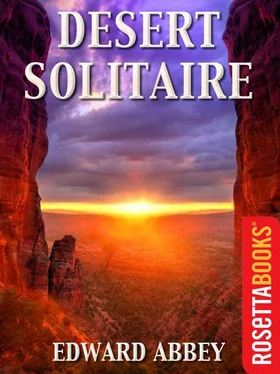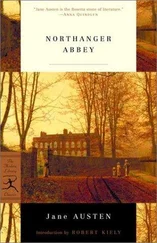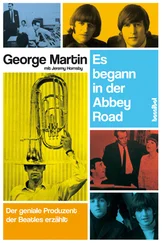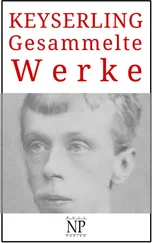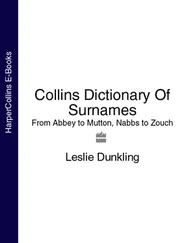Abbey, Edward - Desert Solitaire (Edward Abbey Series )
Здесь есть возможность читать онлайн «Abbey, Edward - Desert Solitaire (Edward Abbey Series )» — ознакомительный отрывок электронной книги совершенно бесплатно, а после прочтения отрывка купить полную версию. В некоторых случаях можно слушать аудио, скачать через торрент в формате fb2 и присутствует краткое содержание. Год выпуска: 2011, Издательство: RosettaBooks, Жанр: Старинная литература, на английском языке. Описание произведения, (предисловие) а так же отзывы посетителей доступны на портале библиотеки ЛибКат.
- Название:Desert Solitaire (Edward Abbey Series )
- Автор:
- Издательство:RosettaBooks
- Жанр:
- Год:2011
- ISBN:нет данных
- Рейтинг книги:4 / 5. Голосов: 1
-
Избранное:Добавить в избранное
- Отзывы:
-
Ваша оценка:
- 80
- 1
- 2
- 3
- 4
- 5
Desert Solitaire (Edward Abbey Series ): краткое содержание, описание и аннотация
Предлагаем к чтению аннотацию, описание, краткое содержание или предисловие (зависит от того, что написал сам автор книги «Desert Solitaire (Edward Abbey Series )»). Если вы не нашли необходимую информацию о книге — напишите в комментариях, мы постараемся отыскать её.
Desert Solitaire (Edward Abbey Series ) — читать онлайн ознакомительный отрывок
Ниже представлен текст книги, разбитый по страницам. Система сохранения места последней прочитанной страницы, позволяет с удобством читать онлайн бесплатно книгу «Desert Solitaire (Edward Abbey Series )», без необходимости каждый раз заново искать на чём Вы остановились. Поставьте закладку, и сможете в любой момент перейти на страницу, на которой закончили чтение.
Интервал:
Закладка:
“Look here, old horse, have a sniff of this.” I offered him the pebble with one hand and with the other unbuttoned a button of my shirt, preparing to ease out the rope when the chance came. “Go on, have a look.…”
I was within six feet of the monster.
“Now you just relax, Moon-Eye old boy. I’m coming in where you are now.” I started to push through the boughs of the juniper. “Easy boy, easy now.…”
He backed violently, jarring the whole tree. Loose twigs and berries rained around us. The good eye glared at me, the bad one shone like a boiled egg—monocular vision.
“Take it easy, old buddy.” Speaking softly. I had one hand on the rope. I stepped forward again, pushing under the branches. Softly—“Easy, easy, don’t be scared—”
Moon-Eye tried to back again but his retreat was blocked. Snorting like a truck he came forward, right at me, bursting through the branches. Dry wood snapped and popped, dust filled the air, and as I dove for the ground I had a glimpse of a lunatic horse expanding suddenly, growing bigger than all the world and soaring over me on wings that flapped like a bat’s and nearly tore the tree out of the earth.
When I opened my eyes a second later I was still alive and Moon-Eye was down in the wash fifty feet away, motionless as a statue, waiting. He stood with his ragged broomtail and his right-angled pelvic bones toward me but had that long neck and coffin head cranked around, watching me with the good eye, waiting to see what I would do next. He didn’t intend to exert himself unless he was forced to.
The shade of the tree was pleasant and I made no hurry to get up. I sat against the trunk and checked for broken bones. Everything seemed all right except my hat a few feet away, crushed into the dirt by a mighty hoof. I was thirsty though and looked around for the canteen before remembering where I’d left it; I could see it down in the wash, near the horse.
Moon-Eye didn’t move. He stood rigid as stone, conserving every drop of moisture in his body. But he was in the sun now and I was in the shade. Perhaps if I waited long enough he’d be forced to come back to the tree. I made myself comfortable and waited. The silence settled in again.
But that horse wouldn’t come, though I waited a full hour by the sun. The horse moved only once in all that time, lowering his head for a sniff at a bush near his foreleg.
The red cliffs rippled behind the veil of heat, radiant as hot iron. Thirst was getting to me. I stirred myself, got up painfully, and stepped out of the wreckage of the juniper. The horse made no move.
“Moon-Eye,” I said—he listened carefully—“let’s get out of here. What do you say? Let’s go home, you miserable old bucket of guts. Okay?”
I picked up my flattened hat, reformed it, put it on.
“Well, what do you say?”
I started down the slope. He raised his head, twitched one ear, watching me. “Are you crazy, old horse, standing out here in the heat? Don’t you have any sense at all?”
I did not approach him directly this time but moved obliquely across the slope, hoping to head him down the canyon toward the creek and the trail to the corral. Moon-Eye saw my purpose and started up the canyon. I hurried; the horse moved faster. I slowed to a walk; he did the same. I stopped and he stopped.
“Moon-Eye, let me tell you something. I can outrun you if I have to. These Utah cowboys would laugh themselves sick if I ever mentioned it out loud but it’s a fact and you ought to know it. Over the long haul, say twenty or thirty miles, it’s a known fact that a healthy man can outrun a horse.”
Moon-Eye listened.
“But my God, in this heat, Moon-Eye, do you think we should? Be sensible. Let’s not make fools of ourselves.”
He waited. I squatted on my heels and passed my forefinger, like a windshield wiper, across my forehead, brushing off the streams of sweat. My head felt hot, damp, feverish.
“What’s the matter with you, Moon-Eye?”
The horse kept his good eye on me.
“Are you crazy, maybe? You don’t want to die out here, do you, all alone like a hermit? In this awful place.…” He watched me and listened. “The turkey buzzards will get you, Moon-Eye. They’ll smell you dying, they’ll come flapping down on you like foul and dirty kites and roost on your neck and drink your eyeballs while you’re still alive. Yes, they do that. And just before that good eye is punctured you’ll see those black wings shutting off the sky, shutting out the sun, you’ll see a crooked yellow beak and a red neck crawling with lice and a pair of insane eyes looking into yours. You won’t like that, old horse.…”
I paused. Moon-Eye was listening, he seemed attentive, but I sensed that he wasn’t really much interested in what I was saying. Perhaps it was all an old story to him. Maybe he didn’t care.
I continued with the sermon. “And when the buzzards are through with you, Moon-Eye—and you’ll be glad when that’s over—why then a quiet little coyote will come loping down the canyon in the middle of the night under the moon, Moon-Eye, nosing out your soul. He’ll come to within fifty yards of you, old comrade, and sit for a few hours, thinking, and then he’ll circle around you a few times trying to smell out the hand of man. Pretty soon his belly will get the best of his caution—maybe he hasn’t eaten for two weeks and hasn’t had a chance at a dead horse for two years—and so he’ll come nosing close to you, tongue out and eyes bright with happiness, and all at once when you’re hardly expecting it he’ll pounce and hook his fangs into your scrawny old haunch and tear off a steak. Are you listening to me, Moon-Eye? And when he’s gorged himself sick he’ll retire for a few hours of peaceful digestion. In the meantime the ants and beetles and blowflies will go to work, excavating tunnels through your lungs, kidneys, stomach, windpipe, brains and entrails and whatever else the buzzards and the coyote leave.”
Moon-Eye watched me as I spoke; I watched him. “And in a couple of weeks you won’t even stink anymore and after a couple of months there’ll be nothing left but your mangled hide and your separated bones and—get this, Moon-Eye get the picture—way out in eternity somewhere, on the far side of the sun, they’ll hang up a brass plaque with the image of your moon-eyed soul stamped on it. That’s about all. Years later some tired and dirty cowboy looking for a lost horse, some weary prospector looking for potash or beryllium will stumble up this way and come across your clean white rib cage, your immaculate skull, a few other bones.…”
I stopped talking. I was tired. Would that sun never go down beyond the canyon wall? Wasn’t there a cloud in the whole state of Utah?
The horse stood motionless as a rock. He looked like part of that burnt-out landscape. He looked like the steed of Don Quixote carved out of wood by Giacometti. I could see the blue of the sky between his ribs, through the eyesockets of his skull. Dry, odorless, still and silent, he looked like the idea—without the substance—of a horse.
My brain and eyes ached, my limbs felt hollow, I had to breathe deliberately, making a conscious effort. The thought of the long walk back to my saddle pony, the long ride back to the pickup truck, made my heart sink. I didn’t want to move. So I’d wait, too, wait for sundown before starting the march home, the anabasis in retreat. I glanced toward the sun. About four o’clock. Another hour before that sun would reach the rim of the canyon. I crawled back to the spotted shade of the juniper and waited.
We waited then, the horse and I, enduring the endless afternoon, the heartbreaking heat, and passed the time as best we could in one-sided conversation. I’d speak a sentence and wait about ten minutes for the next thought and speak again. Moon-Eye watched me all the time and made no move.
Читать дальшеИнтервал:
Закладка:
Похожие книги на «Desert Solitaire (Edward Abbey Series )»
Представляем Вашему вниманию похожие книги на «Desert Solitaire (Edward Abbey Series )» списком для выбора. Мы отобрали схожую по названию и смыслу литературу в надежде предоставить читателям больше вариантов отыскать новые, интересные, ещё непрочитанные произведения.
Обсуждение, отзывы о книге «Desert Solitaire (Edward Abbey Series )» и просто собственные мнения читателей. Оставьте ваши комментарии, напишите, что Вы думаете о произведении, его смысле или главных героях. Укажите что конкретно понравилось, а что нет, и почему Вы так считаете.
